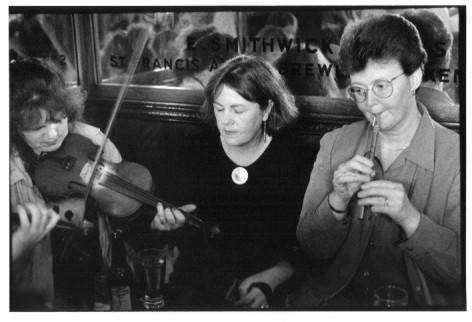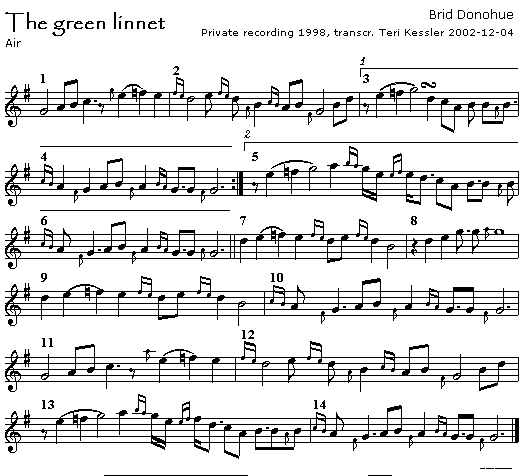
Brid Donohue playing in Crotty's, Kilrush, with Jacqui and Bernadette McCarthy. Photo (c) Peter Laban.
A brief analysis by Teri Kessler, 3 December 2002

Brid Donohue is originally from the townland of Caherrush, Co. Clare, a headland on the south side of the bay on which Spanish point also sits. She grew up with the music close at hand. She started learning the tin whistle in primary school. Children who arrived early had to go inside to keep them out of mischief. The teacher, Tessie Walsh (Junior Crehan's sister-in-law) would teach them whistle to keep the children busy. Her uncle, J.C. Talty, from the same townland, played the whistle and was the fluteplayer in the Tulla Ceiliband for 25 years. JC taught Brid music, taking her along to band gigs, fleadhs etc. Another relative, Willie Clancy, was also a big influence.

Brid Donohue playing in Crotty's, Kilrush,
with Jacqui and Bernadette McCarthy.
Photo (c) Peter Laban.
Now living in Glendine, Brid has been teaching local kids music for years and turns most of them into very nice musicians. She also teaches whistle and flute at the annual Willie Clancy Summer School in Miltown Malby, Co. Clare.
Ms. Donohue opens the tune gently, holding the first note slightly and adding just enough vibrato to set the tone for the piece. In Bar 1, she slides from the E into the F, giving a feel of lamentation. In Bar 3, she uses the slide again from the F into the G. The effect is almost that of word painting when compared to the lyrics of the song. "There an empress he saw..." She continues to use this effect throughout, in Bars 5, 7, 9, 11 and 13. The ornamentation is direct and applied only as necessary to convey the feeling behind the piece. Her use of ornamentation in Bars 2 & 9, and especially in Bars 5 and 13, resembles the human voice when singing such a ballad. This is a beautiful example of an air played with lovely phrasing and carefully chosen ornamentation.
The Green Linnet is one of the Napoleonic songs, aka "The Song of Sorrow", from the
19th century. In the last line of the first verse (all are not included), "Boney" is a
nickname for Napoleon. Napoleon was a favorite, especially with the peasantry
of Ireland, and they held high hopes for his victory.
An additional example can be heard by on the Chieftains' album "Bonaparte's retreat", on which Dolores
Keane sings a few verses
THE GREEN LINNET
Curiosity led a young native of Erin,
To view the gay banks of the Rhine,
Where an Empress he saw and the gold that she was wearing
All over with diamonds did shine.
No goddess in splendour was ever yet seen,
To equal this fair maid so mild and serene,
In soft accents she cried, O my linnet so green,
Sweet Boney, will I e'er see you more?
As with any air, it is extremely difficult to put the song into notation. The individual's interpretation, variations and use of note duration do not fit into the requirements of time measures when transferring to the page. As always, please refer to the soundclip for a true understanding and detail of the playing.
Teri Kessler, 3 December 2002